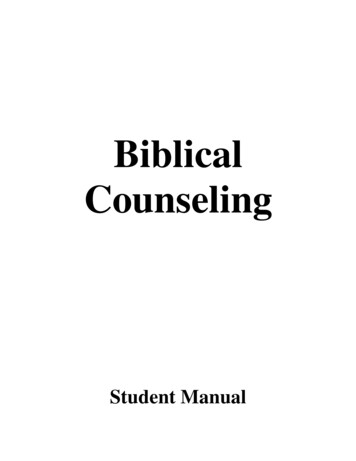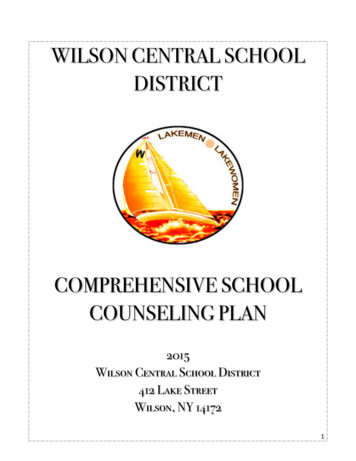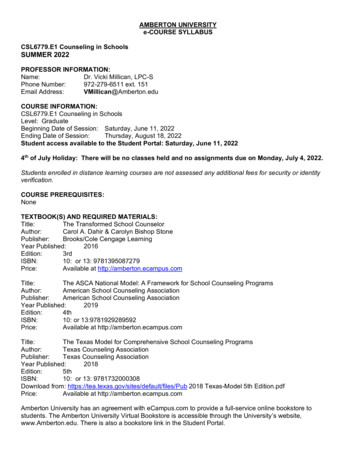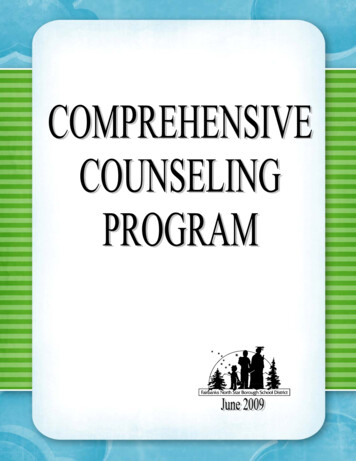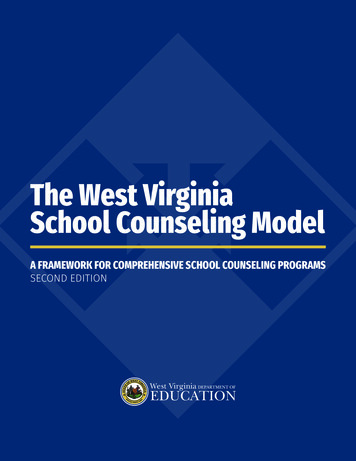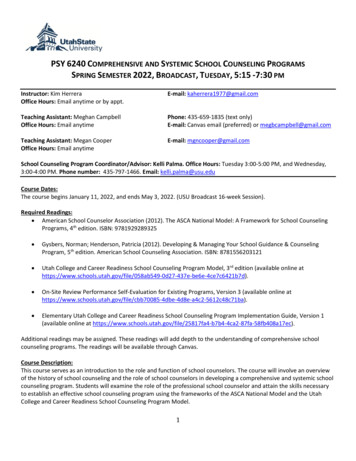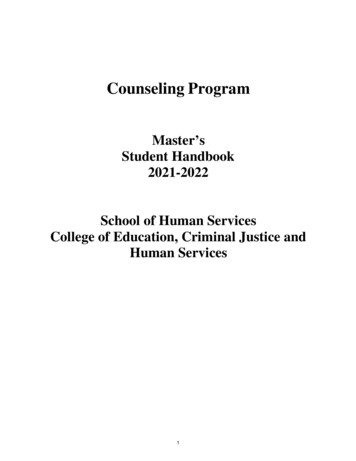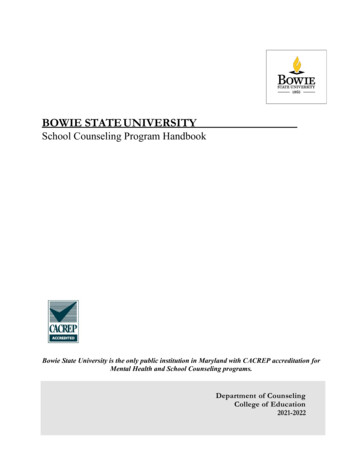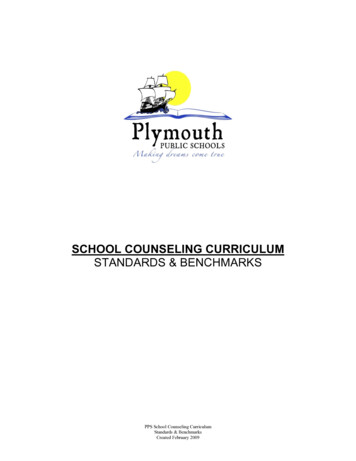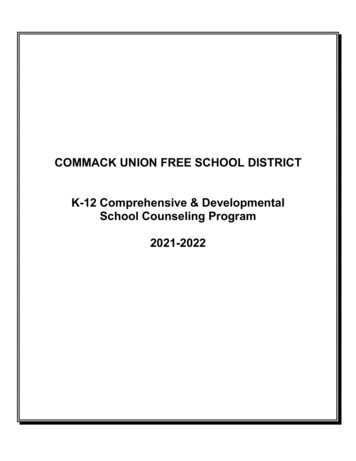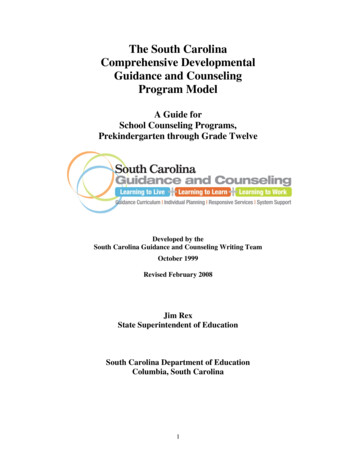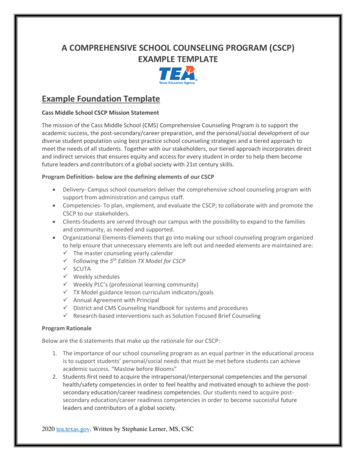
Transcription
A COMPREHENSIVE SCHOOL COUNSELING PROGRAM (CSCP)EXAMPLE TEMPLATEExample Foundation TemplateCass Middle School CSCP Mission StatementThe mission of the Cass Middle School (CMS) Comprehensive Counseling Program is to support theacademic success, the post-secondary/career preparation, and the personal/social development of ourdiverse student population using best practice school counseling strategies and a tiered approach tomeet the needs of all students. Together with our stakeholders, our tiered approach incorporates directand indirect services that ensures equity and access for every student in order to help them becomefuture leaders and contributors of a global society with 21st century skills.Program Definition- below are the defining elements of our CSCP Delivery- Campus school counselors deliver the comprehensive school counseling program withsupport from administration and campus staff.Competencies- To plan, implement, and evaluate the CSCP; to collaborate with and promote theCSCP to our stakeholders.Clients-Students are served through our campus with the possibility to expand to the familiesand community, as needed and supported.Organizational Elements-Elements that go into making our school counseling program organizedto help ensure that unnecessary elements are left out and needed elements are maintained are: The master counseling yearly calendar Following the 5th Edition TX Model for CSCP SCUTA Weekly schedules Weekly PLC’s (professional learning community) TX Model guidance lesson curriculum indicators/goals Annual Agreement with Principal District and CMS Counseling Handbook for systems and procedures Research-based interventions such as Solution Focused Brief CounselingProgram RationaleBelow are the 6 statements that make up the rationale for our CSCP:1. The importance of our school counseling program as an equal partner in the educational processis to support students’ personal/social needs that must be met before students can achieveacademic success. “Maslow before Blooms”2. Students first need to acquire the intrapersonal/interpersonal competencies and the personalhealth/safety competencies in order to feel healthy and motivated enough to achieve the postsecondary education/career readiness competencies. Our students need to acquire postsecondary education/career readiness competencies in order to become successful futureleaders and contributors of a global society.2020 tea.texas.gov. Written by Stephanie Lerner, MS, CSC
3. The school counseling program will enable students to develop their full potential because ourmission is to help students become our future leaders and contributors of a global society.4. The rationale for the SC program can be determined by reviewing assessment results. Theconclusions we can draw from our various CMS assessments are: high crisis numbers (1.2 crisesper day), more crises and discipline referrals in spring semester, number of failing classesincreased as year progressed, Feb/May/Apr and 6th graders had highest discipline referrals;counselors spend a significant amount of time on system support.5. The goals of our campus include safety and student academic success.6. Current theories and professional trends of our school counseling program include SolutionFocused Brief Counseling.Program Assumptions – see completed checklists on pg. 56Program Goals (highlighted) & ProcessNeeds Assessment Results- see Google Forms data; the most significant needs of staff/students in needsassessments include: Getting along with friends or others/ difficulty making friends Teasing, bullying, sexting, cyberbullying Dealing with change/new situations at home with family Physical/ sexual abuse, neglect or domestic violence Handling stress healthfully Anger management Destigmatizing mental illness Study skills Improving gradesWe reviewed the following data points: Group data Yearly guidance reports Staff evaluation Staff/student needs assessments Crisis numbers Discipline referrals Failure reportsWe found the following patterns in our data: All counselors are above the recommended TEA percentage of 10%-15% for system support All counselors low on TEA percentage of 35%-40% for guidance curriculum but, this can be fixedthrough data re-distribution and through hiring more school counselors Out of 176 days we had more than one crisis per day We had more crises in the spring semester than in the fall Our group data indicated knowledge gained through pre/posttests Discipline data showed highest refs in Apr, May, Feb and with 6th graders Academic data showed more failing classes as year progressed Academically, 8th grade failed the most classes 6th grade had the highest number of discipline referrals Staff evaluations patterns showed overall very high marks for school counseling program2020 tea.texas.gov. Written by Stephanie Lerner, MS, CSC
We found the following areas of significance in our data points: High crisis numbers (1.2 crises per day) More crises and discipline referrals in the spring semester Counselors spend a significant amount of time on system support 6th graders had the highest number discipline referrals 8th graders had the highest number of failing gradesThe most significant needs identified in needs assessments were: Getting along with friends or others/ difficulty making friends Teasing, bullying, sexting, cyberbullying Dealing with change/ new situations at home with family Physical/ sexual abuse, neglect or domestic violence Handling stress healthfully Anger management Destigmatizing mental illnessAdvisory council input/insight to be incorporated into CSCP goals: We will share 4 CSCP goals at first Leadership meeting to elicit revisions/additions TBD through discussion of student concerns at weekly PLC meetings and monthly LeadershipmeetingProgram Goals for the 2020-21 Year#1. By May 2021, students in 6/7/8gr will decrease the number of failed classes by 10% from theprevious school year to the current school year. Source: CMS Failure Term Report from Skyward#2. By May 2021, students in 6/7/8gr will decrease the number of discipline referrals by 10% fromprevious school year to the current school year. Source: CMS Annual Discipline Report from Skyward#3. By May 2021, students in 6/7/8gr will decrease the number of crisis incidents by 10% from theprevious school year to the current school year. Source: CMS Crisis ReportsCSCP Design PrioritiesClients- ranked by importance according to our goals (1 is most stratorsOthersStudent Needs- ranked by importance according to our goals (1 is most important):1. Prevention needs2. Remediation needs3. Crisis needsStudent Competencies- ranked by importance according to our goals (1 is most important):1. Interpersonal Effectiveness2. Intrapersonal Effectiveness2020 tea.texas.gov. Written by Stephanie Lerner, MS, CSC
3. Personal Health and Safety4. Post-Secondary Education and Career ReadinessSchool Counselor Competencies- ranked by importance according to our goals (1 is most important):1.2.3.4.5.6.7.8.9.10.Program Management (plan/implement CSCP)AdvocacyGuidance (theories, plan lessons, groups, involve others)Professional Standards (ethics)Professional Behavior (relationships, use of time)ConsultationCoordinationLeadershipCounseling (interventions for students personal/social development, individual/group counseling)Student AssessmentCounselor Time/Program Component- ranked by importance according to our goals (1 is mostimportant):1.2.3.4.Guidance curriculum 35-40%Responsive Services 35-40%System Support 10%Individual Planning 15-25%Example Program Design TemplateGuidance Curriculum Services1. Strategic Content Area-Intrapersonal EffectivenessNeeds Assessment Findings- Staff/students noted high need for strategies to handle stress healthfullyand manage anger.Guidance Curriculum Lesson Topic/s- stress and anger managementSMART Goal/s By May 2021, students in 6/7/8gr will decrease the number of discipline referrals by 10% fromprevious school year to the current school year. By May 2021, students in 6/7/8gr will decrease the number of crisis incidents by 10% from theprevious school year to the current school year.2. Strategic Content Area-Interpersonal EffectivenessNeeds Assessment Findings- Staff/students noted high need for strategies to better get along with/makefriends and to deal with change/new situations at home with family.Guidance Curriculum Lesson Topic/ss- friendship, conflict resolution, family changesSMART Goal/s By May 2021, students in 6/7/8gr will decrease the number of discipline referrals by 10% fromprevious school year to the current school year.3. Strategic Content Area-Personal Health & Safety2020 tea.texas.gov. Written by Stephanie Lerner, MS, CSC
Needs Assessment Findings- Staff/students noted high need for strategies to handle: harmful behaviors(bullying/sexting/cyberbullying) and abuse (physical/ sexual abuse/neglect/domestic violence) anddestigmatizing mental illness.Guidance Curriculum Lesson Topic/s- child abuse prevention, destigmatizing mental illness, anti-bullyingSMART Goal/s By May 2021, students in 6/7/8gr will decrease the number of discipline referrals by 10% fromprevious school year to the current school year. By May 2021, students in 6/7/8gr will decrease the number of crisis incidents by 10% from theprevious school year to the current school year.4. Strategic Content Area-Post Secondary Education and Career ReadinessNeeds Assessment Findings- Staff/students noted high need for strategies to improve study skills andacademic achievement.Guidance Curriculum Lesson Topic/s- success in school, organizational/study skillsSMART Goal By May 2021, students in 6/7/8gr will decrease the number of failed classes by 10% from theprevious school year to the current school year.Campus Responsive Services*All topics on page 91 are issues at CASS MS, so we picked the 3 top issues and grouped some others into them.Identified Need #1- Failure of core classesPreventative, Remedial, or Crisis- PreventativeIntervention/Plan of Action- Attend grade level team meetings to learn about student concerns fromteachers/staff.Outcome/Follow- Meet with students mentioned in concerns.Identified Need #2- Student stress and anxietyPreventative, Remedial, or Crisis- RemedialIntervention/Plan of Action- Stress management groups, healthy coping skills groups; all student supportgroups will address stress and include a stress management mini-lesson.Outcome/Follow- Group posttests to determine success of above intervention.Identified Need #3- Student crisis outcries (“3 Hurts” emergencies)Preventative, Remedial, or Crisis- CrisisIntervention/Plan of Action- Create/apply CASS MS Crisis Protocol Steps.Outcome/Follow- See protocol, meet with student to do a day-after-crisis-incident check in.Individual Planning PrioritiesDomain- CareerGoal- IIIAii. Students will take advantage of their educational opportunities: understand cost associatedwith postsecondary education and that post-secondary education requires resources.School Counselor Considerations- Conceptual Cube components of guidance curriculum, middle,postsecondaryAdvocacy- NADomain- EducationGoal/s- IIIDi. Student will demonstrate awareness that education and training is needed to achievecareer goals: assess/modify educational (6-year) plan to support career goals.2020 tea.texas.gov. Written by Stephanie Lerner, MS, CSC
School Counselor Considerations- Conceptual Cube components of individual planning, middle,postsecondary planning & readinessAdvocacy- Educate parents/guardians on importance of 6-year plans.Domain- PersonalGoal/s- III3ii. Students will learn how to apply goal-setting in career: set and achieve some long andshort term goals.School Counselor Considerations- Conceptual Cube components of individual planning, middle,intrapersonal effectivenessAdvocacy- NASystem Support ToolsMonthly Calendar- see attached calendar at end of this CSCP.Program Balance Chart/Weekly Schedule- see next page.KEY for the following tools:GC: Guidance CurriculumRS: Responsive ServicesIP: Individual PlanningSS: System SupportNCD: Non-counseling duty2020 tea.texas.gov. Written by Stephanie Lerner, MS, CSC
Program Balance Chart/Weekly Schedule Example 8:30Crisis Followup (RS)Staff Referrals/SST(SS)Crisis Followup(RS)Staff Referrals/SST(SS)Crisis Followup (RS)8:30-9Student Concerns(RS)Student Concerns(RS)Student Concerns(RS)Student Concerns(RS)Student Concerns(RS)9-9:30New StudentScheduling/ Advising(IP)Guidance Lessons(GC)New StudentScheduling/Advising (IP)New StudentScheduling/Advising (IP)Weekly CounselingTeam Meeting (SS)9:30-10New StudentScheduling/ Advising(IP)New StudentScheduling/ (RS)In SchoolSuspensionConferences (RS)Guidance Lessons(GC)New StudentScheduling/Advising (IP)New StudentScheduling/Advising ions/Referrals(RS)Counselor Cornerduring StudentLunches (RS)Counselor Cornerduring StudentLunches (RS)Counselor Cornerduring StudentLunches (RS)IndividualSessions/Referrals(RS)In SchoolSuspensionConferences (RS)Group Counseling(GC)New StudentScheduling/ Advising(IP)New StudentScheduling/ (RS)In SchoolSuspensionConferences (RS)2-2:30New StudentScheduling/ Advising(IP)Guidance Lessons(GC)New StudentScheduling/Advising (IP)Group Counseling(GC)Weekly PrincipalCounselor Meeting(SS)2:30-3New StudentScheduling/ Advising(IP)New StudentScheduling/ Advising(IP)Session Followup/Recordkeeping (SS)Guidance Lessons(GC)New StudentScheduling/Advising (IP)New StudentScheduling/Advising (IP)Session Followup/Recordkeeping(SS)Group Counseling(GC)Weekly PrincipalCounselor Meeting(SS)New StudentScheduling/ Advising(IP)Session Followup/Recordkeeping 11-1:301:30-23-3:303:30-4Guidance Lessons(GC)Guidance Lessons(GC)Guidance Lessons(GC)Guidance Lessons(GC)Guidance Lessons(GC)Guidance Lessons(GC)Guidance Lessons(GC)Guidance Lessons(GC)Guidance Lessons(GC)Session Followup/Recordkeeping (SS)2020 tea.texas.gov. Written by Stephanie Lerner, MS, CSCGroup Counseling(GC)Group Counseling(GC)Group Counseling(GC)Group Counseling(GC)Group Counseling(GC)Group Counseling(GC)Group Counseling(GC)Group Counseling(GC)Group Counseling(GC)Session Followup/Recordkeeping(SS)
Counseling Department Monthly Calendar Example TemplateThis calendar is based on the following guidelines.1. The Texas Model School Counseling Program Guide Components and Content Areas of:ComponentsGuidance CurriculumResponsive servicesIndividual PlanningSystem SupportContent AreasInterpersonal EffectivenessIntrapersonal EffectivenessPersonal Health and SafetyPost-Secondary Planning and Career Readiness2. The three program goals of the CMS Comprehensive School Counseling Program:Program Goals for the 2020-21 Yeara. By May 2021, students in 6/7/8gr will decrease the number of failed classes by 10%from previous year to current school year. Source: SMS Failure Term Report fromSkywardb. By May 2021, students in 6/7/8gr will decrease the number of discipline referrals by10% from previous school year to current school year. Source: CMS Annual DisciplineReport from Skywardb. By May 2021, students in 6/7/8gr will decrease the number of crisis incidents by 10%from previous school year to current year. Source: CMS Crisis Reports3. Campus Improvement Plan Goals:Goal 1: Increase student success through expanded opportunities for all students with afocus on college and career readiness.Goal 2: Increase collaboration with stakeholders through consistent procedures,practices, and communications.Goal 3: Increase engagement of school community in addressing growth issues whilemaintaining focus on the CMS Mission.Goal 4: Maintain financial strength and stability while addressing needs and providingappropriate resources.Goal 5: Provide a safe and supportive learning environment.2020 tea.texas.gov. Written by Stephanie Lerner, MS, CSC
CALENDARAugustContent Area- Personal Health & SafetyCSCP Goals Addressed- a, b, cDomain- PersonalGuidance Curriculum Lesson Topics (GC) Meet the counselor: schedule change protocol, handling “3 hurts” emergencies vscounseling request forms, Campus Crime Stoppers/incident reports with schoolresource officer, guidance curriculum pretest administration to student body Crisis prevention- child abuse awarenessMajor Projects/Events Create yearly counseling calendar (SS) New student class selection (IP) Plan 1st semester guidance lessons (SS) Counseling program presentation to staff (SS) Assist with scheduling data entry (NCD) Parent/student schedule consults (IP) Cardinal Camp & Meet the Teacher -present counseling program (GC) Train all Cardinal Student Mentors (RS)SeptemberContent Area- Interpersonal EffectivenessCSCP Goals Addressed- a, b, cDomain- AcademicGuidance Curriculum Lesson Topics (GC) Crisis prevention- destigmatizing mental illness Conflict resolution- role play (rumors/gossip) Good grades strategy- how to do grade self-checksMajor Projects/Events Advise students on scheduling concerns/conflicts (IP) Student concern check-ins (RS) Data entry for schedule changes (NCD) National Suicide Prevention Week activities (GC) Plan/start 1st semester group counseling (GC) Team/SST consults for new school year (SS) Assist with creating campus plan for completion Personal Graduation Plans (PGP) andutilizing career interest inventory (SS) Parent Counselor Corner during Back to School Night (SS)2020 tea.texas.gov. Written by Stephanie Lerner, MS, CSC
OctoberContent Area- Post Secondary Planning/Career ReadinessCSCP Goals Addressed- a, b, cDomain- SocialGuidance Curriculum Lesson Topics (GC) Crisis prevention- antibullying/substance abuse prevention Conflict resolution-Letters to Bullied Girl story with conflict resolution applicationactivity Good grades strategy- organizing backpack regularlyMajor Projects/Events Trauma-informed/crisis review presentation to staff (SS) CREST preparation (SS) Academic concern student conferences (RS) 1st semester group counseling (GC) Red Ribbon Week schoolwide activities (GC) Assist with At-Risk Report submissions (NCD)NovemberContent Area- Post Secondary Planning/Career ReadinessCSCP Goals Addressed- a, bDomain- CareerGuidance Curriculum Lesson Topics (GC) Crisis prevention- mindfulness Good grades strategy- body language in the classroom Create PGPs using career interest inventory resultsMajor Projects/Events Behavioral concern student conferences (RS) Parent presentation: Intro to PGPs (SS) CREST submission (SS) LSSSCA Conference (SS) Document group outcomes and refer/consult (SS) Assist with Early College High School (ECHS) recruitment- 8th grade 1-1 conferences (IP) Assist with spring registration preparation in Skyward (NCD) 1-1 Meetings to advise students on PGPs during Counselor Corner in cafeteria, asneeded (IP)2020 tea.texas.gov. Written by Stephanie Lerner, MS, CSC
DecemberContent Area- Intrapersonal EffectivenessCSCP Goals Addressed- a, bDomain- PersonalGuidance Curriculum Lesson Topics (GC/IP)- Minute MeetingsMajor Projects/Events Cardinal Student Mentor training (RS) Group counseling- mini groups (GC) Assist with PGP data entry (NCD) Mid-year counseling program audit (SS) Plan 2nd semester guidance lessons (SS) Parent Counselor Corner during band concert (SS)WINTER BREAKJanuaryContent Area- Interpersonal EffectivenessCSCP Goals Addressed- a, cDomain- SocialGuidance Curriculum Lesson Topics (GC) Crisis prevention- cyberbullying/sexting awareness with School Resource Officer Good grades strategy- grade self-check reviewMajor Projects/Events 5th grade students visit to CMS campus (GC) Advise students on 2nd semester scheduling concerns/conflicts (IP) Counseling program mid-year presentation to staff (SS) Assist with 2nd semester schedule changes (NCD) 1st semester group data analysis/presentation (SS) Assist with ECHS student/parent meetings and applications go out (IP) Assist with spring registration planning (SS) Start planning 2nd semester groups (SS)2020 tea.texas.gov. Written by Stephanie Lerner, MS, CSC
FebruaryContent Area- Personal Health & SafetyCSCP Goals Addressed- a, b, cDomain- PersonalGuidance Curriculum Lesson Topics (GC) Crisis prevention- ways to manage stress Conflict resolution-anger management role plays Good grades strategy- organizing schoolwork in a binderMajor Projects/Events Plan and start 2nd semester groups (GC) National School Counseling Week activities (SS) Personal financial awareness- schoolwide activity (IP) Academic concern student conferences (RS) Teen dating violence prevention- schoolwide activity (RS) TSCA Conference (SS)MarchContent Area- Intrapersonal EffectivenessCSCP Goals Addressed- a, bDomain- AcademicGuidance Curriculum Lesson Topics (GC) Crisis prevention- healthy eating to manage moods Using PGPs to select 2021-22 classes Good grades strategy- using a plannerMajor Projects/Events Continue 2nd semester group counseling (GC) 1-1 Meetings to advise students on 2021-22 class selection during Counselor Corner incafeteria, as needed (IP) ECHS acceptance conferences (IP) Parent presentation: college & career readiness (SS) Behavior concern student conferences (RS)2020 tea.texas.gov. Written by Stephanie Lerner, MS, CSC
AprilContent Area- Post Secondary Planning/Career ReadinessCSCP Goals Addressed- a, cDomain- AcademicGuidance Curriculum Lesson Topics (GC) Looking ahead to college: Big Future website exploration Crisis prevention- using healthy coping skills Good grades strategy- taking effective notesMajor Projects/Events Continue 2nd semester group counseling (GC) Team/SST consults for students struggling to pass grade (SS) Meet with students struggling to pass grade (RS) Local college CTE field trip (IP) Parent presentation: suicide prevention (SS)MayContent Area- Post Secondary Planning/Career ReadinessCSCP Goals Addressed- a, b, cDomain- CareerGuidance Curriculum Lesson Topics (GC)- Schoolwide College Week ActivitiesMajor Projects/Events Cardinal Student Mentor celebration (RS) Document group outcomes and refer/consult (SS) Staff evaluation of counseling program (SS) Staff/student/parent needs assessment for next year’s guidance/group topics (SS) Guidance curriculum posttest (GC) Open House/Parent Counselor Corner (SS) HS CTE Center field trip (IP)JuneContent Area –NACSCP Goals Addressed- a, b, cDomain- Academic, Personal, Social, CareerGuidance Curriculum Lesson Topics- NA (no students on campus)Major Projects/Events Program planning meeting with principal (complete Annual Agreement) (SS) Program development for next year (SS) 2nd semester group data analysis (SS) EOY counseling program presentation to staff (SS) Comprehensive school counseling program (CSCP)- evaluation, analysis, revisions, creation fornext year (SS) Create/present next year’s CSCP goals to leadership team for feedback/revision (SS)2020 tea.texas.gov. Written by Stephanie Lerner, MS, CSC
KEY:GC: Guidance CurriculumRS: Responsive ServicesIP: Individual PlanningSS: System SupportNCD: Non-counseling duty2020 tea.texas.gov. Written by Stephanie Lerner, MS, CSC
Cass Middle School CSCP Mission Statement The mission of the Cass Middle School (CMS) Comprehensive Counseling Program is to support the academic success, the post-secondary/career preparation, and the personal/social development of our diverse student population using best practice school counseling strategies and a tiered approach to
